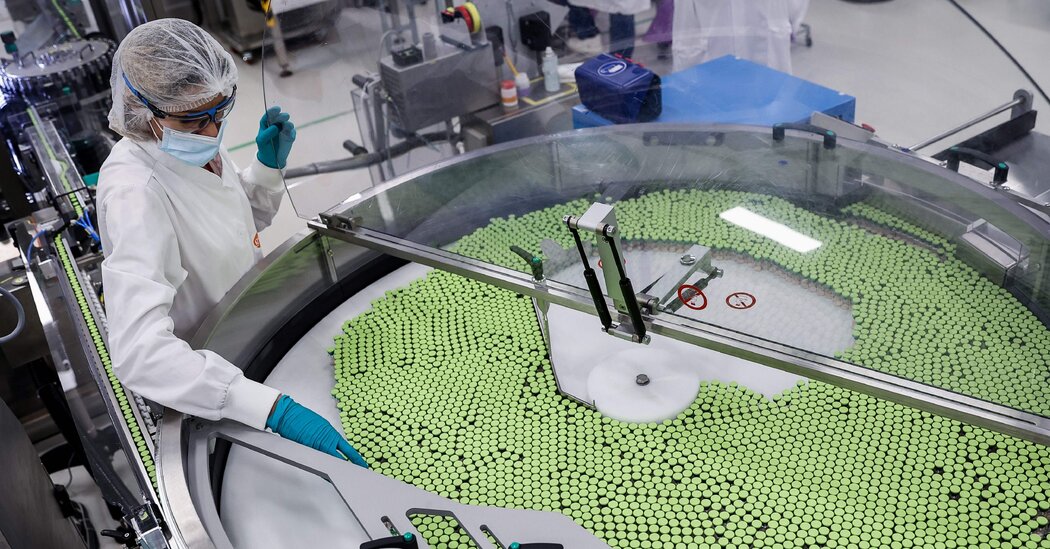The trade deal reached between the United States and the European Union on Sunday will impose a 15 percent tariff on imported medicines from Europe. Drugmakers manufacture some of their biggest and best-known blockbusters there, including Botox, the cancer medication Keytruda and popular weight-loss drugs like Ozempic.
The tariff rate is much lower than the levies of up to 200 percent that President Trump had threatened. Still, the new import costs stand to add billions of dollars in expenses for the drug industry and could lead to price increases for some medicines. That could translate into higher out-of-pocket costs and higher health insurance premiums for Americans.
The 15 percent rate is final and will not be affected by the national-security-related tariffs that Mr. Trump is expected to impose on pharmaceuticals made elsewhere in the world, according to a White House official and senior European Commission officials. This outcome is something of a win for the pharmaceutical industry, which had feared that drugs from Europe would be hit with high levies related to national security. Both sets of pharma tariffs are expected to take effect simultaneously sometime next month, officials said.
The pharmaceutical industry depends on a complex global supply chain: Production of most medications happens in multiple countries, with plants around the world handling different stages of the process. Europe is perhaps the most important piece of the global network that produces brand-name drugs — those with patent protection and typically high prices and fat profit margins.
Pharmaceutical products are Europe’s No. 1 export to the United States. European officials have expressed worries in recent months that pharma tariffs could prompt drugmakers to pull back on investments, at the expense of jobs, factories and tax revenue.
Ireland in particular has become a pharma manufacturing hub, in part because doing business there helps drug companies lower their overall tax bills. Nearly all of the largest drugmakers have factories there. Last year, Ireland sent the United States $50 billion worth of pharma products, most of which were made by multinational drug companies.
Europe manufactures the active ingredients for 43 percent of the brand-name drugs consumed in the United States, according to U.S. Pharmacopeia, a nonprofit that tracks the drug supply chain. No other region produces a greater share.
Europe also makes active ingredients for 18 percent of the generic drugs taken in the United States, which have lower prices and account for a vast majority of Americans’ prescriptions.
Certain generic drugs made in Europe will be exempt from the new tariff, Ursula von der Leyen, president of the European Commission, said on Sunday. The White House and the European Commission did not respond to requests for comment on which generic drugs would be exempt.
The threat of tariffs on generic medicines, which have thin margins, has raised concerns about exacerbating shortages. Experts who track pharmaceutical supply chains said they were not worried that brand-name drugs produced in Europe would go into shortage because they have such high profit margins.
The new tariffs will be paid by drugmakers importing finished products or ingredients into the United States. Many are expected to try to pass at least some of the costs along to employers and government programs like Medicare that cover most of the tab for Americans’ prescription drugs.
Patients whose insurance requires them to pay a deductible or a percentage of a drug’s price could eventually face higher out-of-pocket costs for some drugs. In some cases, however, contractual agreements and the threat of steep financial penalties may deter manufacturers from sharply raising prices.
Some health insurance premiums are already set to rise. Insurers in New York, Oregon and Maryland recently told regulators that tariffs were prompting them to seek higher premium increases next year for certain health plans than they otherwise would have.
The pharmaceutical industry has lobbied fiercely against the tariffs, saying that drugmakers could spend less on research and manufacturing in the United States as a result. “Tariffs are not the answer for promoting greater domestic production of these products,” the drug industry’s main lobbying group, PhRMA, said in a statement in May.
For months, Mr. Trump has been promising to impose punishing tariffs on imported pharmaceuticals. His goal, he has said, is to bring more manufacturing back to the United States.
In April, the Trump administration opened an investigation into whether imports of medicines and pharmaceutical ingredients threatened America’s national security. Mr. Trump brought the inquiry under a legal authority known as Section 232, which he has used to justify tariffs on cars and other industries.
With medicines from Europe exempt from Section 232 tariffs, those levies now threaten two of the other most important regions in the drug industry’s global production network: India and China, both of which focus on generic drugs. India has been negotiating a trade deal that could address its giant generic drug industry and avert national-security-related tariffs from the United States.
Ana Swanson and Jeanna Smialek contributed reporting.
Rebecca Robbins is a Times reporter covering the pharmaceutical industry. She has been reporting on health and medicine since 2015.
The post Tariffs on Medicines From Europe Stand to Cost Drugmakers Billions appeared first on New York Times.




